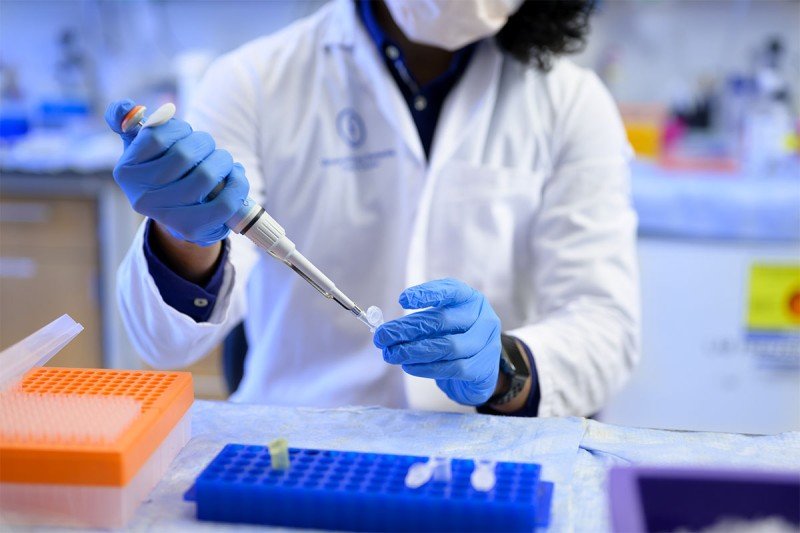
Today, one year after its founding, Break Through Cancer has awarded Memorial Sloan Kettering Cancer Center (MSK) more than $12 million in grants to intercept cancer at the earliest stages and find cures to several of the deadliest cancers. This funding is part of a total of $50 million in grants from Break Through Cancer which will support several cutting-edge research projects using a novel “TeamLab” structure — designed to maximize interdisciplinary collaboration among researchers at MSK, Dana-Farber Cancer Institute, Johns Hopkins Kimmel Cancer Center, MIT’s Koch Institute for Integrative Cancer Research, and University of Texas M.D. Anderson Cancer Center. MSK is a founding member of the foundation aimed at accelerating collaborative research, clinical trials, and cures for the deadliest cancers.
“In one year’s time, Break Through Cancer has been able to make great strides in overcoming conventional barriers to multi-institutional teamwork while identifying clinical challenges that will benefit from the foundation’s bold, collaborative approach,” explains Lisa M. DeAngelis, MD, MSK’s Physician-in-Chief and Chief Medical Officer, and Break Through Cancer Board Member. “It is our hope that these united efforts will advance research as rapidly as possible for diseases with poor prognoses in which progress has been slow.”
“Break Through Cancer’s differentiator is its commitment to collaboration,” said David A. Scheinberg, MD, PhD, Director of the Experimental Therapeutics Center at MSK, and Break Through Cancer Board Member. “The TeamLabs approach is designed to maximize interdisciplinary collaboration among the top researchers in the country. MSK is proud to be a part of this effort.”
Break Through Cancer’s initial investment of $50M will fund the following TeamLab research projects for an initial three-year period and will include researchers and physicians from all five member institutions with the aim to bring new approaches and innovative ideas to the clinical challenges of glioblastoma, ovarian, and pancreatic cancers. This new model for collaboration enables researchers to boldly tackle some of the biggest challenges in cancer by reducing the day-to-day barriers to cross-institutional collaboration such as contract negotiations, data sharing, intellectual property, and rights to authorship will pave the way for faster discoveries. Projects have been funded based on their unique cohort of researchers and potentially transformational science. They include:
Intercepting Ovarian Cancer
Recent research has shown that most, if not all, high grade serous ovarian cancers originate in the fallopian tubes. This presents an opportunity to reduce ovarian cancer incidence by exploring the impact of fallopian tube removal as a primary prevention strategy (known as opportunistic or prophylactic salpingectomy). Systematic, large-scale approaches to understand the impact of fallopian tube removal are now warranted. The Intercepting Ovarian Cancer team will focus on the detection of the earliest lesions by creating a “pre-cancer atlas” and will develop new technologies to image and collect living fallopian tube cells. The team will develop strategies to expand awareness and access to safe and effective ways that women can have their fallopian tubes removed when past childbearing years, with a particular focus on women who are already undergoing abdominal surgeries. The team will also develop clinical procedures training for non-OB/GYN surgeons, seek health insurance clearance for this preventative surgery, and create a registry of information for women who have had or plan to have tube removal surgery. The culmination of the project will be a public health campaign to enable women to advocate for their best options.
Targeting Minimal Residual Disease in Ovarian Cancer
The majority of patients with ovarian cancer are diagnosed with late-stage disease. These women face cure rates as low as 15% depending on the subtype of ovarian cancer, a statistic that has not changed over the past several decades. A key factor underlying these poor cure rates is the ability of cancer cells resistant to chemotherapy to persist after frontline treatment. This persistent minimal residual disease (MRD) is clinically undetectable and represents “the seed” that eventually manifests as cancer recurrence. The goal of this project is to transform the care of women with ovarian cancer by developing unprecedented capabilities for understanding and targeting MRD. To do this, the team will develop and benchmark the accuracy of new blood biopsy and “second-look” surgical technologies to monitor this state at high resolution including extensive use of single-cell analysis.
Revolutionizing GBM Drug Development Through Serial Biopsies
Therapeutic development for glioblastoma (GBM) has been stunted following several large and expensive phase III clinical trials that failed, despite encouraging preliminary results. A central challenge is the complexity of the human brain, which cannot be modeled perfectly in the laboratory. The Investigating Longitudinal Sampling in Glioblastoma team will demonstrate the safety and feasibility of accessing and deeply analyzing tissue and other samples from GBM patients over the course of therapy—both surgically and through the use of cutting-edge liquid biopsy technologies on cerebrospinal fluid. The objective of the project is to learn how to scale the approach to future therapeutic strategies and create a systematic approach to advancing improved treatments and cures for GBM.
Conquering KRAS in Pancreatic Cancer
The KRAS gene, which is altered in more than 90% of pancreas cancers, has long been believed to be undruggable. With many promising new KRAS-targeting therapies either now available or on the horizon, the field may be on the cusp of a revolution in treatment for pancreatic ductal adenocarcinoma (PDAC) patients. The Conquering KRAS in Pancreatic Cancer team will integrate clinical and laboratory approaches to understand why patients do or do not respond to the new therapies using breakthrough single-cell technologies to deeply investigate biology in organoids, mice, and humans. The team will develop pharmaceutical partnerships to accelerate the translation of new KRAS inhibitors into effective drugs for this disease. The large number of patients at Break Through Cancer partner institutions will enable trials that would be difficult at a single institution since some patients have rare but important KRAS mutations. The Conquering KRAS in Pancreatic Cancer project will be supported in partnership with the Lustgarten Foundation.
